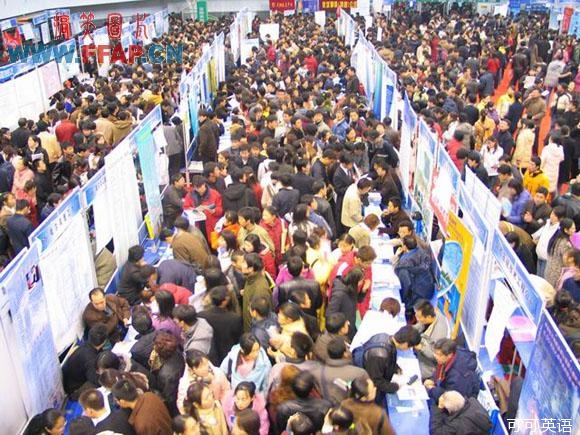
A MAJORITY of university and college students set to graduate in the city next month are still looking for a job due to the grim employment situation.
由于嚴(yán)峻的就業(yè)形勢,城市中大多數(shù)將于下個(gè)月畢業(yè)的大學(xué)生仍在找工作。
Only 29 percent of 178,000 students who are to graduate this June have signed an offer, been admitted to postgraduate studies or decided to study abroad, according to the Shanghai Student Affairs Center.
今年6月畢業(yè)的178000名學(xué)生中只有29%的人簽了合同、考取了研究生或決定出國留學(xué),根據(jù)上海學(xué)生事務(wù)中心。
The percentage was up 4 percent from March but down 3 percent year-on-year, even though the number of graduates is about the same as last year, the center said.
這個(gè)比例比3月份上漲了4%,但同比下降3%,盡管畢業(yè)生數(shù)目與去年相當(dāng),該中心說。
The center attributed the poor employment prospects for graduates mainly on the recovering economy, adding that the number of available positions declined from the past two years.
該中心認(rèn)為畢業(yè)生暗淡的就業(yè)前景主要在于經(jīng)濟(jì)復(fù)蘇,并補(bǔ)充說在過去兩年里職位增量在下降。
Some industries, especially manufacturing and foreign trade, have either suffered a downturn or are in a transition, making it especially difficult for students who majored in those fields.
一些行業(yè),尤其是制造業(yè)和對外貿(mào)易,要么遭受衰退要么處于過渡期,這對主修那些專業(yè)的學(xué)生來說特別艱難。
In order to get a job, some students lowered their salary expectations while others accepted a position in a different industry.
為了找到一份工作,有些學(xué)生降低了他們薪水預(yù)期而其他人接受了不同行業(yè)里的職位。
"I would take a job as long as the salary is 3,000 yuan (US$488) a month," said a student majoring in printing art design at University of Shanghai for Science and Technology.
“只要工資3000元(488美元)一個(gè)月我就接受那份工作,”一個(gè)在上海科技大學(xué)主修印刷藝術(shù)設(shè)計(jì)的學(xué)生說。
The senior said he has had more than 20 job interviews, but hasn't heard back from any of the companies.
這位畢業(yè)生說他已經(jīng)參加了20多個(gè)面試,但沒有得到任何公司的回復(fù)。
In February, students were still expecting a starting salary of at least 4,000 yuan, up 225 yuan from the average salary of 2012 graduates, according to China International Intellectech (Shanghai) Corp.
今年2月,學(xué)生仍預(yù)期起薪至少4000元,比2012畢業(yè)生的平均工資高225元,據(jù)中智上海經(jīng)濟(jì)技術(shù)合作公司。
Only 20 percent of seniors at University of Shanghai for Science and Technology have signed up for a job or have been admitted to postgraduate studies, said Niu Xiangyu, director of the student employment guidance center at the school.
上海科技大學(xué)只有20%的畢業(yè)生已經(jīng)簽訂了一份工作或進(jìn)入研究生學(xué)習(xí),學(xué)生就業(yè)指導(dǎo)中心的主任牛翔宇說。
Niu said the demand for mechanical and manufacturing graduates was down 40 percent from last year.
牛主任說機(jī)械制造業(yè)的畢業(yè)生需求比去年下降了40%。
Teachers from student employment centers at other universities and colleges said the accumulation of jobless graduates from previous years and the increasing number of overseas students who return to China for jobs have made it more difficult for this year's graduates to land a job.
其他高校學(xué)生就業(yè)中心的老師說過去幾年失業(yè)畢業(yè)生的積累、越來越多的海外學(xué)生回國工作讓今年的畢業(yè)生就業(yè)更加困難。
"The overwhelming number of applicants have made competition for jobs harder and fiercer," said Tan Yuxu, director of the employment guidance center at Shanghai University of Finance and Economics.
“數(shù)量龐大的申請者使得就業(yè)競爭越來越激烈,“上海財(cái)經(jīng)大學(xué)就業(yè)指導(dǎo)中心的譚玉旭主任說。
"But the students are reluctant to lower their expectations," Tan said.
“但學(xué)生不愿降低預(yù)期,”譚主任說。
For example, some students refused to take jobs requiring different shifts even though the salary could be more than 4,000 yuan per month.
例如,一些學(xué)生拒絕接受需要倒班的工作即使工資可能會超過4000元/月。
"Many students lost job opportunities like that simply because they don't want to endure hardships," Tan said.
“許多學(xué)生失去了工作機(jī)會,只是因?yàn)樗麄儾幌氤钥啵弊T主任說。
Tan also said some students were spoiled by their parents and gave up easily after they failed to find an ideal job. They then relied on their parents and missed the best time to get a job, Tan added.
譚主任還說一些學(xué)生被父母寵壞了,在沒有找到一份理想的工作之后很容易就放棄了。然后他們依賴自己的父母,錯(cuò)過了找工作的最好時(shí)間,譚說。
Tan suggested parents help their children lower expectations for their first job rather than compare them to their peers or help them become a NEET, defined as a young person "not in education, employment, or training."
譚主任建議父母幫助孩子降低他們第一份工作的期望值,而不是將他們與同齡人比較,或幫助他們成為“啃老族”,定義“不是在教育、就業(yè)或培訓(xùn)”的年輕人。
Nationwide, nearly 7 million university students are about to graduate this summer, the largest number since 1949.
全國范圍內(nèi),今年夏天近700萬名大學(xué)生即將畢業(yè),自1949年以來的最大數(shù)量。


